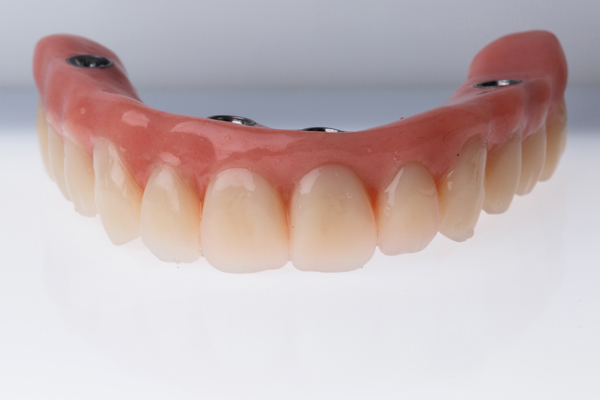Will I Need a Bone Graft for the All-on-4 Procedure?

All-on-4® implants refer to a procedure where the patient gets four posts attached to their jawbone to insert dentures for a simple, quick, and long-lasting smile. They are growing in popularity due to their permanence and effectiveness. There are some things to consider before getting an implant surgery, with one of the most significant components being if you will need a bone graft.
What is a bone graft?
A bone graft is a procedure done by your dental professional to increase the bone amount in your jaw where the implants would usually be placed. Different types of bone grafts use different bones or materials to appropriately meet your needs. The process typically involves the patient being sedated, opening the gums in the area where the bone will be placed, inserting the bone, and securing the graft with stitches or adhesive.
Why would somebody need a bone graft?
Bone grafts are typically needed for those who have lost some bone support or density. This could be from a few factors, such as a jaw fracture, disease, age, or tooth loss. The most common of these is tooth loss. The four different types of bone grafts are:
- Autografts: Uses bone from your own body
- Allografts: Bone from another person or cadaver
- Xenografts: Bone from another species or animal
- Alloplasts: Synthetic material like Bioglass instead of bone
Understanding the background of bone grafts
Initially, your dentist will take scans or x-rays to determine if you need a bone graft. If you want to get All-on-4 implants, they need a stable structure to be placed onto your jawbone, where the implants will be. Think of it like a house that needs a good foundation first.
If it’s determined that you need a bone graft, you will get specific instructions from your dentist on what you should do before your surgery. Once you are done, you will need to apply ice packs, eat soft foods, and sleep with your head lifted a bit.
The main benefits of bone grafting for All-on-4 implants
While you may need to get a bone graft for the implants, this is not always the case. Typically, your dentist will discuss your treatment plan with you before getting implants to address any outlying issues, such as bone or tooth loss. Once you are healed from a bone graft, your dentist can complete the All-on-4 surgery.
These implants serve many different benefits, particularly for those not fond of their other options. For example, dentures may not fit or feel comfortable for many patients. They also may require resizing. This is also an excellent choice for those losing their teeth or who want something longer lasting.
Schedule a consultation today
With All-on-4® implants, you will have a fantastic smile in as little as one office visit. They can last up to two decades with proper oral hygiene, making them one of the top contenders in the field. Discuss it with our dental team and begin your evaluation to see if this is an ideal tooth replacement option for you.
Request an appointment here: https://dentistbronxnewyork.com or call University Dental Associates at (718) 733-6600 for an appointment in our The Bronx office.
Check out what others are saying about our dental services on Yelp: All-on-4 in The Bronx, NY.
Related Posts
All-on-4® implants are an ever-growing trend due to their permanence and ease. Many people struggle with temporary tooth solutions such as dentures, as they can slide around and need frequent resizing. All-on-4 implants are completed by inserting posts into the jawbone and replacing all teeth. Before attempting to get surgery for the implants, there are…
Missing teeth can affect your smile, confidence, and even your ability to eat or speak comfortably. Dental implants have become a popular solution because they offer a permanent, natural-looking replacement. Whether you’re considering implants for one tooth or multiple, understanding the process, benefits, and care involved is key to making the right choice.Dental implants are…
Dental implants are one of the most effective and innovative methods of tooth replacement. Dental implants can experience their own problems such as failure, but it is quite unlikely. Thankfully, there are ways to prevent implant failure. Although dental implants rarely fail, it is possible. Being aware of how dental implants fail may help one…
Gum disease is one of the most common oral health issues, yet many people don’t realize they have it until it’s progressed. Left untreated, gum disease can lead to tooth loss, bad breath, and even contribute to other health problems. The good news is that gum disease is largely preventable and very manageable when caught…
